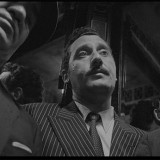It’s that great excitement you get when you come across a truly rewarding film by a director you have never seen much of his work when everything seems to work exactly how you’d want it to be. And Mafioso by Neorealist director, Alberto Lattuada is simply that perfectly fun film. It’s the same sad story, these cinematic gems have limited distribution anywhere and are hard to come by. Unless the film is within the programming roadmap of the great people at The Criterion Collection, which is the case here.
You may have heard about Alberto Lattuda through his collaboration with Federico Fellini on Lights of Variety (Luci del varietà -1950), but his long and widely acclaimed work is known for his unique sensibilities of telling a simple story of the individual without compromise. “A good director is the one that can keep his audience nailed to their seats. Because the moment you see someone leave the room that means the director didn’t do a good job like a scene that went too long…” Said Lattuada in a rare interview in the bonus section of this DVD.
This film brings one of Italy’s greatest actors, Alberto Sordi, to tell the story of Nino who has the perfect life – a great job, a wonderful family – who lives in Milan. Simply an ideal poster of the early 60’s when Italy experienced the Economic Miracle (Boom Economico) with massive economic growth, characterized by the transition from relying on agriculture to industrialization.
You might want to think about this industrialization having the same impact as the Internet and the Digital Age of today. In this sense, you can see the portrayal of Nino’s life in Milan almost in the same period prime-time animated series The Jetsons – who lives in a futuristic utopia, using all kinds of gadgetry in their home. The same you find here in a fun scene when Nino is shaving, while at the same time cleaning his shoes – using all kinds of machinery.
And like today’s reality shows that bring together two completely opposite characters for us to watch the ricochets – Nino takes his ultra-modern family to visit his family in a small Sicilian village for the first time. The interesting element in this film is Lattuada’s unique style of moving the audience from comedy to drama, from Milan to Sicily to New York and back again. All in a fast-paced plot where every scene, camera angle, and soundtrack is carefully calculated.
The film is augmented by the pounding score of Piero Piccioni, glimpses of which you can sample from the above trailer; on one hand, depicting a man’s warm-loving admiration for his family, and his hometown with all the memories and traditions it represents. However flanked by a dramatic score that emphasizes the enigmatic duality of an ordinary life, even robotic to some extent, yet with old storms looming. The sense that what you see isn’t always telling. It’s about the concept of displacement and the need to comply with your roots to keep your family safe millions of worlds apart. To that mix, Piccioni adds light swing tunes, specifically in the public space scenes in the village.
The opening and closing scenes vividly show the monstrous industrial machines that create metal objects and pass them along the assembly line. Could it be that this is a metaphor for Nino’s personality? Originally crafted in Sicily, passed along to Milan, yet still carries those base Sicilian attributes?
Think about it the next time you’re traveling back to your old hometown. How much of this place contributed to who you are today?

